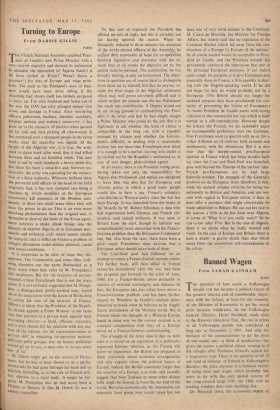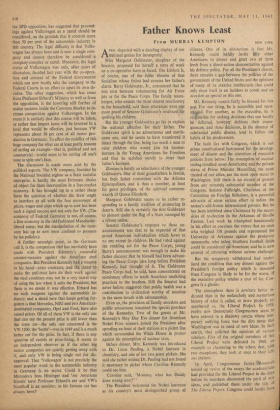Banned Wagen
From SARAH GAINIIAM
BONN
THE question of how much a Volkswagen should cost has become a political factor of the greatest interest and of considerable impor- ance with the failure, at least for the moment, of the Minister of Economics to get the recent price increase withdrawn. As the Volkswagen General Director, Heinz Nordholf, made clear at the Hanover Industrial Fair, the rise in prices of all Volkswagen models was considered as long ago as December 7, 1961. And only the moment of the announcement to up the price of one model only—a third of production--has given the matter a political colour, coming as it did straight after Professor Erhard's appeal for a wage-price stop. There is no question at all of any kind of defiance of Erhard in Volkswagen's decision; the price increase is a business matter of rising costs and wages which probably has more to do with the only partial success of the long-awaited -large VW, the 1500. and its teething troubles than with anything else.
Dr. Heinrich Deist, the economics expert of the SPD opposition, has suggested that proceed- ings against Volkswagen as a cartel should be considered, on the grounds that it controls more than 50 per cent of the automobile industry in this country. The legal difficulty is that Volks- wagen has always been and is now a single com- pany and cannot therefore be considered a company-complex or cartel. Moreover, the legal status of Volkswagen was only, after years of discussion, decided last year with the co-opera- tion and consent of the Federal Government which can now hardly take the company to the Federal Courts in an effort to upset its own de- cision. The other suggestion, which has come from Professor Erhard's Ministry as well as from the opposition, is the lowering still further of motor customs inside the Common Market to in- crease competition against Volkswagen. In the event it is unlikely that this course will be taken, or rather that import taxes will be lowered to a level that would be effective, just because VW represents about 50 per cent of all motor pro- duction in Germany. To affect the stability of this huge company for what are at least partly reasons of setting an example--that is, political and not commercial—would seem to be cutting off one's nose to spite one's face. The discussion is made more acid by the political aspects. The VW company, founded by the National Socialist regime as a State socialist enterprise, is hardly the most fortunate choice of object for State intervention in a free-market economy. It has brought up in a rather sharp form the question of whether the State ought to interfere at all with the free movement of prices, wages and costs which up to now has been such a signal success and not only for VW. (The economy of Federal Germany is not, of course, a free economy in the old-fashioned Manchester- liberal sense; but the manipulation of the econ- omy has up to now been confined to pressure by tax policies.) A further neuralgic point, as the Germans call it, is the comparison that has inevitably been made with President Kennedy's successful counter-measure against the American steel companies. But President Kennedy had a weapon in his hand—arms contracts; and the threat to make the anti-trust laws do their work against the steel combines may not be a very moral way of using the law when it suits the President, but there is no doubt it was effective. Erhard has no such weapons against the automobile in- dustry; and a detail here that keeps getting for- gotten is that Mercedes, NSU and two American- dominated companies, Opel and Ford, have also raised prices. Of all of them VW is the only one that can say the present price is still lower than the same car—the only one concerned is the VW 1200, the 'beetle'—was in 1949 and is a much better car for the price. In fact, if there is any question of cartels or price-fixing, it seems to an independent observer as if the other big motor companies are quietly getting away with it, and only VW is being single out for dis- approval. That `Volkwagent is not precisely the most popular word in the automobile industry in Germany is no secret. Could it be that Mercedes's boss Hitzinger and 'our American friends' have Professor Erhard's ear and VW's Nordhoff is an outsider, as his famous car has always been?



































 Previous page
Previous page